- Home
- Joseph Conrad
The Point Of Honor: A Military Tale Page 6
The Point Of Honor: A Military Tale Read online
Page 6
II
He succeeded in this object no better than the rest of the garrison andthe whole of society. The two young officers, of no especial consequencetill then, became distinguished by the universal curiosity as to theorigin of their quarrel. Madame de Lionne's salon was the centre ofingenious surmises; that lady herself was for a time assailed withinquiries as the last person known to have spoken to these unhappy andreckless young men before they went out together from her house toa savage encounter with swords, at dusk, in a private garden. Sheprotested she had noticed nothing unusual in their demeanour. LieutenantFeraud had been visibly annoyed at being called away. That was naturalenough; no man likes to be disturbed in a conversation with a ladyfamed for her elegance and sensibility" But, in truth, the subjectbored Madame de Lionne since her personality could by no stretch ofimagination be connected with this affair. And it irritated her to hearit advanced that there might have been some woman in the case. Thisirritation arose, not from her elegance or sensibility, but from a moreinstinctive side of her nature. It became so great at last that sheperemptorily forbade the subject to be mentioned under her roof. Nearher couch the prohibition was obeyed, but farther off in the salonthe pall of the imposed silence continued to be lifted more or less. Adiplomatic personage with a long pale face resembling the countenanceof a sheep, opined, shaking his head, that it was a quarrel of longstanding envenomed by time. It was objected to him that the menthemselves were too young for such a theory to fit their proceedings.They belonged also to different and distant parts of France. Asubcommissary of the Intendence, an agreeable and cultivated bachelorin keysermere breeches, Hessian boots and a blue coat embroidered withsilver lace, who affected to believe in the transmigration of souls,suggested that the two had met perhaps in some previous existence.The feud was in the forgotten past. It might have been something quiteinconceivable in the present state of their being; but their soulsremembered the animosity and manifested an instinctive antagonism. Hedeveloped his theme jocularly. Yet the affair was so absurd from theworldly, the military, the honourable, or the prudential point of view,that this weird explanation seemed rather more reasonable than anyother.
The two officers had confided nothing definite to any one. Resentment,humiliation at having been worsted arms in hand, and an uneasy feelingof having been involved into a scrape by the injustice of fate, keptLieutenant Feraud savagely dumb. He mistrusted the sympathy of mankind.That would of course go to that dandified staff officer. Lying in bed heraved to himself in his mind or aloud to the pretty maid who ministeredto his needs with devotion and listened to his horrible imprecationswith alarm. That Lieutenant D'Hubert should be made to "pay for it,"whatever it was, seemed to her just and natural. Her principal concernwas that Lieutenant Feraud should not excite himself. He appeared sowholly admirable and fascinating to the humility of her heart that heronly concern was to see him get well quickly even if it were only toresume his visits to Madame de Lionne's salon.
Lieutenant D'Hubert kept silent for the immediate reason that there wasno one except a stupid young soldier servant to speak to. But he was notanxious for the opportunities of which his severe arrest deprived him.He would have been uncommunicative from dread of ridicule. He was awarethat the episode, so grave professionally, had its comic side. Whenreflecting upon it he still felt that he would like to wring LieutenantFeraud's neck for him. But this formula was figurative rather thanprecise, and expressed more a state of mind than an actual physicalimpulse. At the same time there was in that young man a feeling ofcomradeship and kindness which made him unwilling to make the positionof Lieutenant Feraud worse than it was.
He did not want to talk at large about this wretched affair. At theinquiry he would have, of course, to speak the truth in self-defence.This prospect vexed him.
But no inquiry took place. The army took the field instead. LieutenantD'Hubert, liberated without remark, returned to his regimental duties,and Lieutenant Feraud, his arm still in a sling, rode unquestioned withhis squadron to complete his convalescence in the smoke of battlefieldsand the fresh air of night bivouacs. This bracing treatment suited hiscase so well that at the first rumour of an armistice being signed hecould turn without misgivings to the prosecution of his private warfare.
This time it was to be regular warfare. He dispatched two friends toLieutenant D'Hubert, whose regiment was stationed only a few miles away.Those friends had asked no questions of their principal. "I must pay himoff, that pretty staff officer," he had said grimly, and they wentaway quite contentedly on their mission. Lieutenant D'Hubert had nodifficulty in finding two friends equally discreet and devoted to theirprincipal. "There's a sort of crazy fellow to whom I must give anotherlesson," he had curtly declared, and they asked for no better reasons.
On these grounds an encounter with duelling swords was arranged oneearly morning in a convenient field. At the third set-to, LieutenantD'Hubert found himself lying on his back on the dewy grass, with a holein his side. A serene sun, rising over a German landscape of meadowsand wooded hills, hung on his left. A surgeon--not the flute-player butanother--was bending over him, feeling around the wound.
"Narrow squeak. But it will be nothing," he pronounced.
Lieutenant D'Hubert heard these words with pleasure. One of hisseconds--the one who, sitting on the wet grass, was sustaining his headon his lap-said:
"The fortune of war, _mon pauvre vieux_. What will you have? You hadbetter make it up, like two good fellows. Do!"
"You don't know what you ask," murmured Lieutenant D'Hubert in a feeblevoice. "However, if he..."
In another part of the meadow the seconds of Lieutenant Feraud wereurging him to go over and shake hands with his adversary.
"You have paid him off now--_que diable_. It's the proper thing to do.This D'Hubert is a decent fellow."
"I know the decency of these generals' pets," muttered Lieutenant Feraudthrough his teeth for all answer. The sombre expression of his facediscouraged further efforts at reconciliation. The seconds, bowing froma distance, took their men off the field. In the afternoon, LieutenantD'Hubert, very popular as a good comrade uniting great bravery witha frank and equable temper, had many visitors. It was remarked thatLieutenant Feraud did not, as customary, show himself much abroad toreceive the felicitations of his friends. They would not have failedhim, because he, too, was liked for the exuberance of his southernnature and the simplicity of his character. In all the places whereofficers were in the habit of assembling at the end of the day theduel of the morning was talked over from every point of view. ThoughLieutenant D'Hubert had got worsted this time, his sword-play wascommended. No one could deny that it was very close, very scientific.If he got touched, some said, it was because he wished to spare hisadversary. But by many the vigour and dash of Lieutenant Feraud's attackwere pronounced irresistible.
The merits of the two officers as combatants were frankly discussed; buttheir attitude to each other after the duel was criticised lightly andwith caution. It was irreconcilable, and that was to be regretted. Afterall, they knew best what the care of their honour dictated. It was not amatter for their comrades to pry into overmuch. As to the origin of thequarrel, the general impression was that it dated from the time theywere holding garrison in Strasburg. Only the musical surgeon shook hishead at that. It went much farther back, he hinted discreetly.
"Why! You must know the whole story," cried several voices, eager withcuriosity. "You were there! What was it?"
He raised his eyes from his glass deliberately and said:
"Even if I knew ever so well, you can't expect me to tell you, sinceboth the principals choose to say nothing."
He got up and went out, leaving the sense of mystery behind him. Hecould not stay longer because the witching hour of flute-playing wasdrawing near. After he had gone a very young officer observed solemnly:
"Obviously! His lips are sealed."
Nobody questioned the high propriety of that remark. Somehow it addedto the impressiveness of the affair. Several o
lder officers of bothregiments, prompted by nothing but sheer kindness and love of harmony,proposed to form a Court of Honour to which the two officers wouldleave the task of their reconciliation. Unfortunately, they began byapproaching Lieutenant Feraud. The assumption was, that having justscored heavily, he would be found placable and disposed to moderation.
The reasoning was sound enough; nevertheless, the move turned outunfortunate. In that relaxation of moral fibre which is brought aboutby the ease of soothed vanity, Lieutenant Feraud had condescended inthe secret of his heart to review the case, and even to doubt not thejustice of his cause, but the absolute sagacity of his conduct. Thisbeing so, he was disinclined to talk about it. The suggestion of theregimental wise men put him in a difficult position. He was disgusted,and this disgust by a sort of paradoxical logic

 Heart of Darkness
Heart of Darkness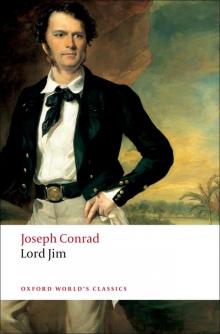 Lord Jim
Lord Jim The Nigger of the Narcissus (Echo Library)
The Nigger of the Narcissus (Echo Library) Victory (Dover Thrift Editions)
Victory (Dover Thrift Editions) Secret Agent
Secret Agent Nostromo
Nostromo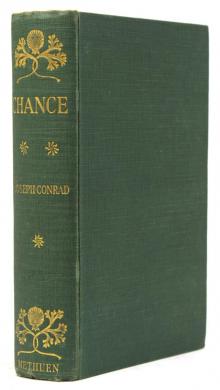 Chance: A Tale in Two Parts
Chance: A Tale in Two Parts Youth
Youth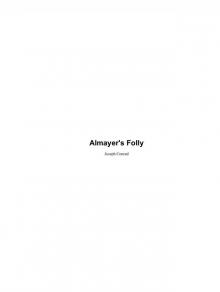 Almayer's Folly
Almayer's Folly The Heart of Darkness and the Secret Sharer
The Heart of Darkness and the Secret Sharer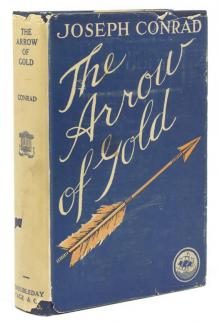 The Arrow of Gold: A Story Between Two Notes
The Arrow of Gold: A Story Between Two Notes The Rescue: A Romance of the Shallows
The Rescue: A Romance of the Shallows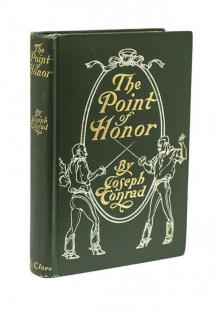 The Point Of Honor: A Military Tale
The Point Of Honor: A Military Tale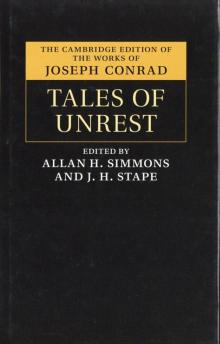 Tales of Unrest
Tales of Unrest Under Western Eyes
Under Western Eyes Gaspar Ruiz
Gaspar Ruiz A Set of Six
A Set of Six Heart of Darkness and the Congo Diary (Penguin Classics)
Heart of Darkness and the Congo Diary (Penguin Classics) Heart of Darkness and Selected Short Fiction
Heart of Darkness and Selected Short Fiction Typhoon
Typhoon Youth, a Narrative
Youth, a Narrative Tomorrow
Tomorrow The Arrow of Gold
The Arrow of Gold The Shadow Line: A Confession
The Shadow Line: A Confession The Rescue
The Rescue Victory (Echo Library)
Victory (Echo Library) The Brute
The Brute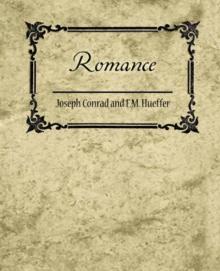 Romance
Romance A Personal Record
A Personal Record Lord Jim: A Tale
Lord Jim: A Tale Heart of Darkness and Selected Short Fiction (Barnes & Noble Classics Series)
Heart of Darkness and Selected Short Fiction (Barnes & Noble Classics Series) Within the Tides
Within the Tides The Secret Sharer and Other Stories
The Secret Sharer and Other Stories Falk
Falk Heart of Darkness and The Secret Sharer
Heart of Darkness and The Secret Sharer Chance
Chance An Anarchist
An Anarchist The Secret Agent: A Simple Tale
The Secret Agent: A Simple Tale The Secret Agent
The Secret Agent Complete Works of Joseph Conrad (Illustrated)
Complete Works of Joseph Conrad (Illustrated) Heart of Darkness and the Congo Diary
Heart of Darkness and the Congo Diary Notes on Life & Letters
Notes on Life & Letters Typhoon (Single Story)
Typhoon (Single Story)